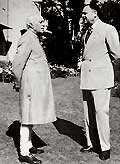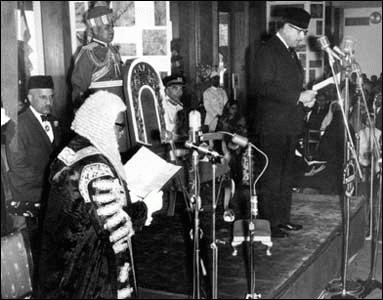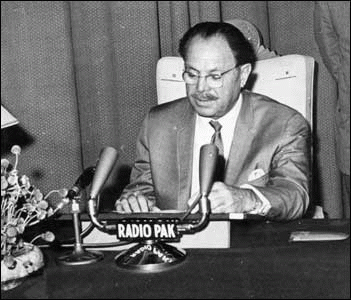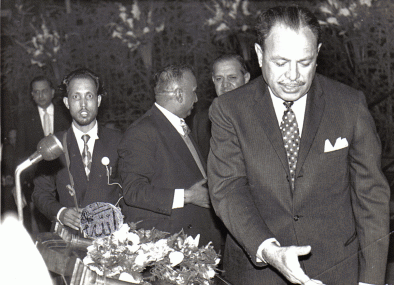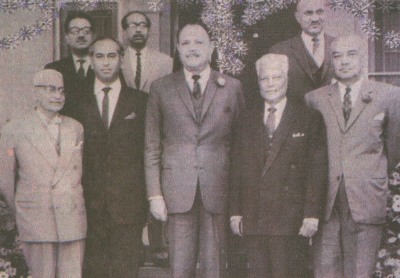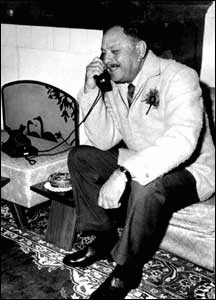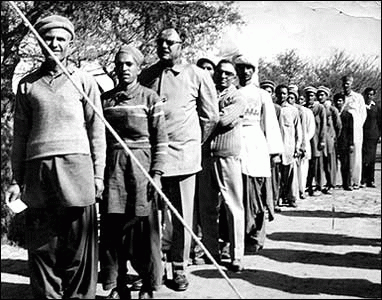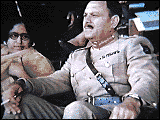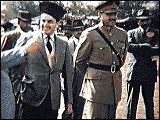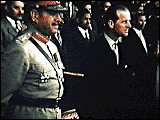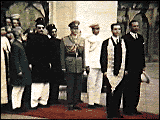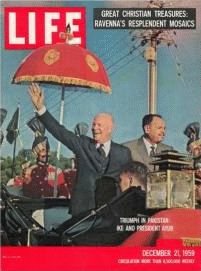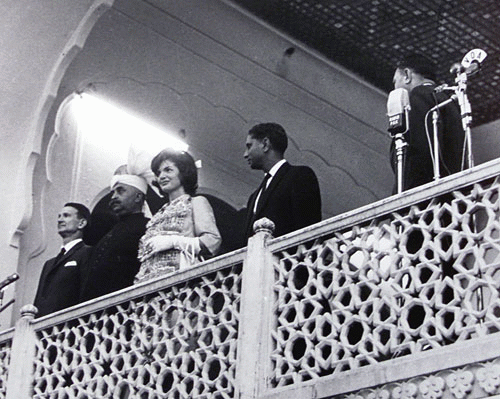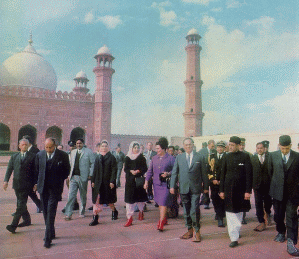|
|
 |
|
|
 |
|
|
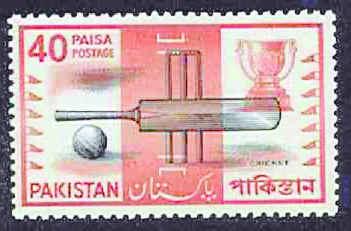 |
|
|
 |
|
|
 |
|
|
| 26 Nov 1964 - Lahorites witness the TV for the first time. The inauguration of first TV station in Lahore brings video age to Pakistan |
|
|
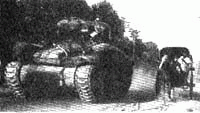 |
The Decade of Development - Ayub's 10 Years |
|
Historical 6 September 1965 address by Ayub Khan
|
|
Important Events 1958 - 68 |
|
27 October '58: General Muhammad Musa appointed Commander-in-Chief 31 December '58: Hoarders deposited hidden foreign currency worth 1 billion and 340 million 1958: Mayo School of Arts, Lahore renamed national College of Arts 1958: afghan Transit Trade agreement between Pakistan and Afghanistan finalized 8 January '59: First Defence Forces Day celebrated 21 January '59: The fiscal year changed from 1 March-30 April to 1 July - 30 June 24 January '59: The famous land reforms announced 23 February '59: Government announced 'Meat Holiday" on Tuesday - Wednesday 10 April '59: Pilot Officer Younis shoots down an Indian jet that intruded Pak airspace - pilot captured 12 July '59: Miss Shukriya Khanum awarded aviation license, becomes first Pakistani woman pilot 4-9 December '59: Intikhab Alm scores a clean bowled in his very first ball of cricket career in a test match against Australia in Karachi, becomes first Pakistani and eight bowler of the world to achieve this mark 24 February '60: The federal cabinet approves construction of new capital near Rawalpindi - to be named "Islamabad", suggested by Abdul Rehman, Headmaster Town Committee High School, Arifwala 23 March '60: Foundation stone of Minar-e-Pakistan laid by Governor West Pakistan Mr Akhtar Hussain 1 May '60: US spy plane U-2 shot down over Russian airspace, flown from US base near Peshawar 23 May '60: Gama pehalwan dies at Lahore 12 August '60: Rs. 10 prize bonds issued 19 September '60: Indus Basin Water Treaty signed between Pakistan and India 15 July '61: "Chanbeili (Jasmine)" flower declared as the national flower 15 October '61: Bashir Shutarban visits USA and welcomed by US Vice President Mr Johnson 1 March '62: President Ayub announces the '62 National Constitution 24 May '62: Maxwell Prize for Professor Abdus Salam for his services in physics 7 June '62: Pakistan launches its first space satellite "Rahber-e-Awwal" from Sonmiani, Balochistan 17 August '62: State Bank of Pakistan announces new currency notes of Rs. 50 and 100 denomination 1 October '62: A Pakistani soldier on UN mission to Indonesia unfurls UN flag at Arian 23 November '62: President Ayub inaugurates first oil refinery of Pakistan at Karachi 23 February '63: Pakistan dispatches Pakistan made "Ghilaaf-e-Ka'aba" to Saudi Arabia 1 January '64: Government College Lahore celebrates its centenary 1 June '64: Pakistan purchases its first submarine "Ghazi" from USA 21 July '64: RCD formed for regional development between Pakistan, Iran and Turkey 3 April '65: President Ayub visits Moscow - first official visit by a Pakistani head of the state April '65: Pakistan and India go to war on disputed territories of Ran and Kuch 14 April '65: President Ayub's statue added to Madam Tussaud's museum, London 20 May '65: PIA's Boeing 720-B crashes near Cairo on its inaugural flight - 104 died 5 February '66: Mujib ur Rehman announces his famous Six Points 4 May '66: Indigenously made ship "Al-Abbas" lowered into sea July '66: PIA installs first IBM-1401 main frame computer in Karachi 14 November '66: Montgomery renamed Sahiwal 14 April '67: Lahore awarded "Hilal-e-Istaqlal" by the President for its contribution during '65 War 6 November '67: Karachi TV station inaugurated 23 November '67: Mangla Dam inaugurated by President Ayub 28 August '68: Shehzadi Sarwat weds Jordanian crown prince Hasan bin Talal 24 September '68: President Ayub inaugurates new building of High Court in Dacca 25 September '68: President Ayub lays foundation stone of Dacca TV station 4 November '68: Earth breaking ceremony of Tarbela Dam |

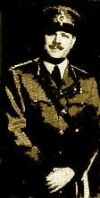 General Muhammad Ayub Khan took over the reins of the country at a time when the political system of the country had almost collapsed and within 9 years of creation of Pakistan, 9 prime ministers had been appointed. When
Sikander Mirza tried to make Ayub Khan
the scapegoat after proclaiming martial law in 1958, Ayub
overthrew him and sent him in exile (where he stayed till his death) and himself took over as the president in October 1958 and ruled Pakistan for almost ten years.
General Muhammad Ayub Khan took over the reins of the country at a time when the political system of the country had almost collapsed and within 9 years of creation of Pakistan, 9 prime ministers had been appointed. When
Sikander Mirza tried to make Ayub Khan
the scapegoat after proclaiming martial law in 1958, Ayub
overthrew him and sent him in exile (where he stayed till his death) and himself took over as the president in October 1958 and ruled Pakistan for almost ten years. 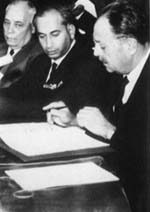 The Tashkent Agreement is described by some as start of the downfall of Ayub's era. Foreign Minister Zulfikar Ali Bhutto, who opposed Pakistan's capitulation, resigned his position and founded the Pakistan People's Party (PPP) in opposition to the Ayub regime. Ayub tried unsuccessfully to make amends and imposed martial law. When things could not be controlled, he resigned in March 1969.
In his last radio address to the nation on 25 March 1969, he said, "I cannot
preside over the destruction of my country" Thus ended a
meaningful, rather stable period of Pakistan history. Although not liked much by the politicians, he is still remembered by a majority of Pakistanis and his painting can still be seen on many trucks plying on the highways.
The Tashkent Agreement is described by some as start of the downfall of Ayub's era. Foreign Minister Zulfikar Ali Bhutto, who opposed Pakistan's capitulation, resigned his position and founded the Pakistan People's Party (PPP) in opposition to the Ayub regime. Ayub tried unsuccessfully to make amends and imposed martial law. When things could not be controlled, he resigned in March 1969.
In his last radio address to the nation on 25 March 1969, he said, "I cannot
preside over the destruction of my country" Thus ended a
meaningful, rather stable period of Pakistan history. Although not liked much by the politicians, he is still remembered by a majority of Pakistanis and his painting can still be seen on many trucks plying on the highways.